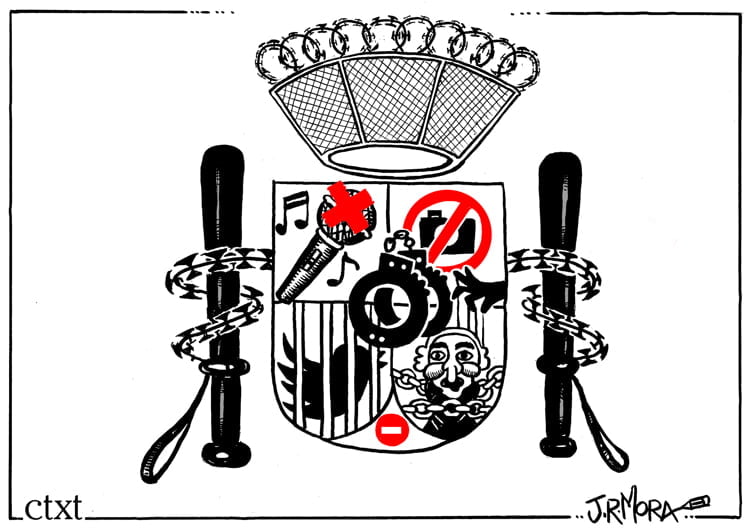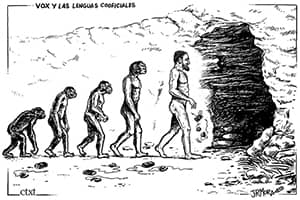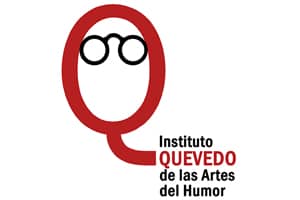
Freedoms in Spain
The cartoon of 26/02/2017 at CTXT
Whenever I add an international case to this list (only cartoon-related issues), someone comes along to remind me of "well, in Spain, so and so".
Without going any further, for this week there are seven trials for glorification of terrorism on social networks.
Yes, Spain is also a country where a lot of beans are cooked. This is reflected in the latest report 2016/17 report on the situation of human rights in the world, produced by Amnesty International.
A quick review
The use of the offence of "glorification of terrorism" to prosecute people peacefully exercising their right to freedom of expression persisted.
New cases of torture and other ill-treatment, excessive use of force and collective expulsion by police officers against persons, including those attempting to enter the Spanish enclaves of Ceuta and Melilla irregularly from Morocco, were reported.
In some cases, allegations of torture and other ill-treatment were not effectively investigated.
The lack of health care for migrants is also highlighted. Legislation adopted in 2012, which restricted irregular migrants' access to free medical care, including primary care, had resulted in 748,835 migrants' health cards being withdrawn, severely restricting or eliminating their access to the health system and, in some situations, putting their lives at risk.
The authorities only agreed to resettle and relocate a few hundred refugees, far fewer than the number stated in the undertakings given.
The Spanish authorities continued to refuse to cooperate with the Argentine justice system in the investigation of crimes committed during the civil war and Franco's regime.
Freedom of expression and assembly
The report recalls that throughout 2016 unjustified restrictions were imposed on the rights to freedom of information, expression and assembly, based on the reform of the Penal Code and the new Law on Citizen Security (Ley Mordaza) that had entered into force in 2015.
The case of the puppeteers Alfonso Lázaro de la Fuente and Raúl García Pérez comes to mind. They were formally charged with glorification of terrorism and incitement to hatred. The arrest took place after several people said they felt offended by the play. In September, the National High Court dismissed the charges of glorification of terrorism. However, at the end of the year, the puppeteers were still charged with incitement to hatred.
During the year, the National Court handed down 25 convictions against 28 people for crimes of glorification of terrorism. Most of these convictions were the result of Operation Spider, which involved the interception of messages posted on social media. From April 2014 to April 2016, 73 people had been arrested as part of the operation.
Torture and other ill-treatment
During this period, new cases of torture and other ill-treatment - including excessive use of force - by law enforcement officials were reported. In some cases, allegations of torture and other ill-treatment were not effectively and thoroughly investigated.
The report recalls, among others, the cases of Esther Quintana, who lost an eye in November 2012 due to the impact of a rubber ball fired by the Mossos d'Esquadra during a protest in Barcelona, and Juan Antonio Martínez González, who died in Cádiz on 4 April 2015 as a result of injuries sustained when he was restrained by law enforcement officers.
In May, in Beortegui Martínez v Spain, the European Court of Human Rights ruled once again that Spain violated the prohibition of torture and other ill-treatment by failing to effectively and thoroughly investigate allegations of torture of incommunicado detainees. It was the seventh such ruling by the Court against Spain.
Impunity
The Spanish authorities continued to refuse to cooperate with the Argentinean justice system investigating crimes under international law committed during the Civil War and Franco's regime. They obstructed the investigation in Argentina, known as the "Querella Argentina", by preventing them from taking statements from some of the victims and the 19 defendants.
Right to housing
Public spending on housing had been cut by more than 50 per cent between 2008 and 2015, and foreclosures continued unabated. According to data from the General Council of the Judiciary, as of September 2016 there had been 19,714 evictions for foreclosure, and 25,688 for non-payment of rent. However, there was no official data reflecting the number of people affected by foreclosures in Spain, nor data disaggregated by sex or age, which prevented measures to protect the most vulnerable people. People facing eviction claims continued to lack adequate legal remedies to enforce their housing rights in court.
Violence against women
According to figures from the Ministry of Health, Social Services and Equality, 44 women had lost their lives at the hands of their partners or ex-partners by December. The Law on Comprehensive Protection Measures against Gender Violence and the establishment of courts for violence against women had entered into force in 2004. However, since then the impact of the law had not been evaluated in a participatory and transparent manner, despite concerns expressed about the effectiveness of prosecutions and the adequacy of victim protection measures.







